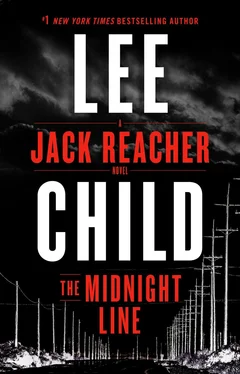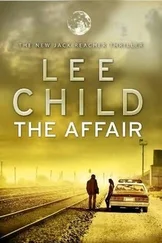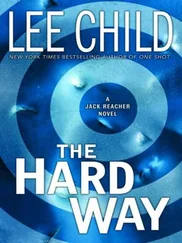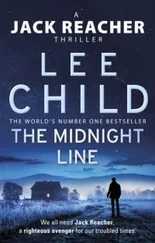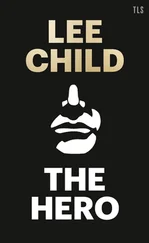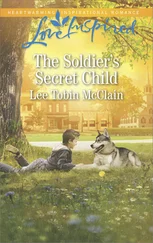Then Reacher told them how he thought the next day might go. Bare bones, a rough outline, three steps, plenty of holes still to fill. Mackenzie was horrified. Bramall looked away, as if to say, is that all you’ve got? Rose quieted down and Reacher felt her eyes on him, under her hood. He felt careful appraisal. She was his main audience. She had the most to lose. She was a professional soldier. She knew no plan survives first contact with the enemy. After that it was about luck, or not. She knew that for sure.
Afterward Reacher asked Bramall to move his truck behind the house, out of sight from the mouth of the driveway. Then he walked up the cowboys’ path, to where he figured their quarters must be. He found them on the porch of a low log building made to look like an old-time bunkhouse. Two guys, not three, sipping from cans of beer. He thought they looked uneasy, with shock and guilt, presumably, and a more ancient humbling, the guy in the boots especially, where you fail to kill a man, and then you look up and see him walking toward you. Some kind of an atavistic feeling, deep in the back of your brain, about your place on the ladder, from back when the only ladders were trees.
Reacher said, “We live in crazy times.”
Neither guy answered. Perhaps they thought he had earned the right to speak uninterrupted. Like giving a lecture. Maybe a cowboy thing. He wanted to tell them no hard feelings. That he understood the pressure. How it distorted judgment. But in the end he didn’t. Too complicated. Instead he told them what they had to do for him. He spelled it out, step by step, and he walked them through it, and he gave them what they needed. He saw it was better than forgiveness. Their heads came up an inch, with new resolve in their eyes, as if they were subject to an older legal system, where through labor or forfeit they could buy back their freedom.
Reacher walked back to Sanderson’s place. It had a light on inside. He checked where Bramall had left the Toyota. It was safely out of sight. Not bad for the FBI. He walked back to his one-room cabin. The little village. Mackenzie’s place had a light on, and so did Bramall’s. All kinds of people, going to bed. All kinds of preparations and rituals. Maybe lengthy. Maybe Bramall brushed his suit, like a valet. No doubt Mackenzie had a complicated routine, involving potions and unguents.
For sure Sanderson did.
Reacher got into bed. Log walls, log ceiling. He understood the appeal. They were solid and massive. They made him feel safe.
Chapter 40
The cowboys were up at dawn, drinking coffee from tin mugs, in rocking chairs, on their bunkhouse porch. The sun came up behind the hills, and threw a flat shadow across the plain. In her house Rose Sanderson slept on. She was not a dawn riser. Fentanyl saw to that. Bramall was up, already showered, and dressed, with his hair brushed, and his necktie knotted. Mackenzie stirred, and woke, and lived a happy oblivious moment where nothing had ever happened. Then she remembered, and half wanted to go back to sleep again, and half wanted to get up and do something, anything, for as long as it felt like progress. In the end going back to sleep won the contest. For a short time. Outside the air was cold. Early on a late summer morning, high in the mountains.
An hour later the cowboys walked down to the mouth of the driveway. They waited there, the same as they had the morning before, and the morning before that, except now they were two, not three. They stood around, not talking, like part of the landscape, infinitely patient. In her house Rose stirred, and woke. She put her hand on her night table. Two patches. Still there. She breathed out and sagged back on her pillow. It was safe to get up. Bramall had made coffee in his token kitchenette, and was out on his porch drinking the last of it. Mackenzie was in the shower, hosing water through her hair.
An hour later the cowboys still waited. The sun climbed higher and came up over the ridge behind them. It dappled the trees where they stood, and warmed the air. In her house Rose was showering. Bramall was still on his porch, his coffee long gone, just passing the time. He was a man life had taught to be patient. Mackenzie was in her cabin, in an armchair, on the phone with her husband, talking about doctors.
An hour later the cowboys were still waiting. Waiting for the man, for their connection, for their hook up. Wasted hours. Part of a user’s life. They leaned on trees and breathed the air, soft and piney. In her house Rose Sanderson was dressed, in her silver top, with the hood pulled forward. She had cut a new piece of aluminum foil, and smeared it with new lotion, and smoothed it into place. She was in her living room, with the window open. In position. Ready. As was Bramall, fifty yards away in the woods. He was sitting on a log. Mackenzie was fifty yards the other way, leaning on the trunk of a fir, with filtered sunlight playing in her hair.
—
A minute later at the mouth of the driveway there was the sound of a straining engine, and the scratch and patter of struggling tires, and the cowboys stood aside. The beat-up old pick-up truck came out of the woods, carrying its camper shell on its back like a turtle. At the wheel Stackley scanned ahead. He saw no black Toyota. No big guy. No one else.
He eased to a stop.
The guy with the boots walked over.
Stackley got out.
He said, “How’s it going?”
The guy said, “You owe us.”
“For what?”
“The big guy.”
“You got it done?”
“Yesterday in the afternoon.”
“How did you do it?”
“Lured him in the woods and shot him with a rifle.”
“Want to show me?”
“Sure,” the guy said. “But he’s an hour uphill. We didn’t want him found too soon.”
“Then how do I know you did it?”
“We’re telling you.”
“I need proof. This is a very large fee we’re talking about here.”
“Two boxes each.”
“Between you,” Stackley said.
Then he looked again and said, “There were three of you yesterday.”
The guy said, “Indisposed.”
“With what?”
“Sore throat.”
“I need proof about the big guy,” Stackley said. “This is a business deal we got going here.”
The guy with the boots put his hand in his pocket and came out with a slim blue booklet. Silver printing. A passport, maybe three years old, a little curled and bent. He handed it over. Stackley opened it up. The big guy’s photo was right there. A face like a stone. His name was Jack Reacher. No middle initial.
“From his pocket,” the guy said. “Less messy than his scalp.”
Stackley put the passport in his own pocket.
He said, “I’ll keep it as a souvenir.”
“Sure.”
“Nice work.”
“We aim to please.”
“But you caught me out,” Stackley said. “Business is too good. I’m running low.”
“What does that mean?”
“You’ll have to wait.”
“That wasn’t the deal.”
“What do you want me to do? Say no to someone else, just in case you got it done, which frankly I didn’t expect so soon? I can’t hold stuff back on a theoretical basis.”
“So you got nothing left?”
“Not much.”
The guy said, “Want to show me?”
“Sure,” Stackley said. He wasn’t averse. A dwindling stock was a kind of advertisement all its own. The modern environment. Business was all about velocity now. It was rule one. He turned toward the camper door.
And came face to face with the guy from the passport.
—
Reacher eased out of the trees, and crept up within a yard of the guy. He was about to tap him in the kidney, but right then the guy turned around toward the camper door, so he tapped him in the stomach instead, just enough to fold him over. He used the same hand on the guy’s shoulder to force him face down in the dirt, where he searched him. He came up with his own passport from one coat pocket, and a nine-millimeter from another, and a .22 jammed in one boot, and a switchblade jammed in the other. The nine-mil was an old Smith & Wesson Model 39, with handsome grips made of polished wood. The .22 was a Ruger, not a vest pocket gun, but it fit in the boot. The switchblade was a piece of junk, made in China, maybe in a toy factory.
Читать дальше
